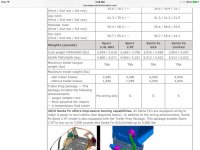I've had quite a number of people ask same question. The trailer is 2700. Add 2 RTs at 950 each and you get about 4600lb. The vehicle is a Hyundai Santa Fe Limited with factory towing package good for 5000lb. I was just looking for the manual (can't find it right now) and I swear that the rating increases to 6500lb if the trailer has electric brakes. I added the controller and the trailer has electric brakes.
I pulled it from Indianapolis to Tyler (empty) and there was plenty of power IF I kept the speed to about 65. At 70-75, it would shift down and RPM would go to 5000 on steep hills.
I'm going to put both Darth & Psycho in, tie them down, and give it a test run in a week or so. IF there is any issue, my son-in-law is reay to loan us their big diesel truck

Electric brakes do not increase the towing capacity of a vehicle. Without electric brakes, your Hyundai is only rated to tow 2000 lbs. That is the difference the brakes have.
We are all adults here, and I am not lecturing you. But, an important part of towing anything is doing the math. Why? Because, if you ever have an accident with your trailer attached, some lawyer is going to do the crunching I am about to do. You are potentially liable if they prove you towed over the rated capacity of the equipment. It's no different than failing to hook up the safety chains, you are the owner of the vehicle.
A quick search for a 2015 Hyundai Santa Fe Limited shows its empty weight to be about 4000 lbs. There is a slight variation for FWD vs AWD.
The important number is the Gross Vehicle Weight Rating (GVWR). Once again, slight variation for type of drive. So, that means you have about 1500 lbs. for you and the family, gas, oil, all the stuff you carry in the car, and wait - you have a trailer attached, so you have to add the tongue weight of the trailer hooked to the back of your car. The 2015 shows a fuel capacity of 18.8 gallons. 18.8x6=112.8. Subtract that from the 1500 lbs available, and you have 1387. Let's say about 1300 lbs to take into account the car battery, oil, and radiator fluid.
Tongue weight can only be confirmed on a truck scale, but a reasonable rule of thumb is 10-15 percent of the loaded trailer weight. That's the trailer, your two rides, the nice camera and big backup battery and so forth. Let's assume you are correct at 4600 lbs. I think that is low, but I'm not there. Your tongue weight is going to be at least 500 lbs. I could stop here, because on most vehicles I have had, the receiver tongue weight rating is 10 percent of the rated tow capacity. There is also a number for your Hyundai that is harder to find, but out there. That is the rear axle rated capacity, and I'm pretty sure you have exceeded it.
Taking the 500 from 1300, you have 800 lbs., or probably less, for you and the family, and the stuff you carry on your trip. Move it to the trailer? Won't work, because I suspect you used published empty weights for your rides, and they are a bit heavier than that. I suspect you will already be over 5000 lbs. for the trailer without adding anything else.
You may never have an accident with this setup, as we all hope we won't. But you will wear out your Hyundai a lot sooner towing this much trailer. Your comments about how it shifted are a clue to that. I do hope you installed a good proportional brake controller, like a Tekonsha Prodigy 3. Set the boost to at least level 2 for the trailer to help stop you. Also test the controller so it activates first when you hit the brakes. You don't want your trailer pushing you to a stop.
 . Thanks to everyone's help, here is the result. The pics focus on the camera system. There are 3 cameras, on the back and one on each side. In the cab, it is a VERY simple plug in to the lighter 12v outlet. Once the cameras are paired, away we go! I'll be posing the pics gradually....
. Thanks to everyone's help, here is the result. The pics focus on the camera system. There are 3 cameras, on the back and one on each side. In the cab, it is a VERY simple plug in to the lighter 12v outlet. Once the cameras are paired, away we go! I'll be posing the pics gradually....
















